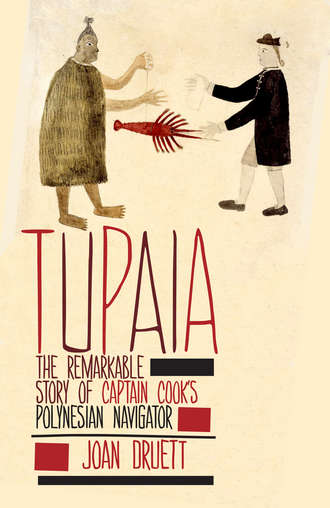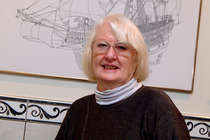Historian Joan Druett is the acclaimed and best-selling author of historical maritime nonfiction and fiction. Books such as Hen Frigates, Rough Medicine and She Captains were invaluable to me in researching my realistic historical fiction featuring a young woman at sea in the age of sail. Druett’s latest work, Tupaia; Captain Cook’s Polynesian Navigator is a masterful biography of a person largely overlooked by historians until now. I am now reading Tupaia, and am captivated! I was delighted when Joan, who had just returned from lecturing on a cruise, agreed to an interview by email.
Linda Collison: Joan, You were a biology and English lit. teacher, a mother, and a fiction writer before you became a well-known author and lecturer on lesser known figures (such as women and Polynesian navigators) who were a large part of our maritime history. What prompted your interest in the past?
Joan Druett: I became interested in maritime history while writing a book on how animals and plants were carried to New Zealand. While I had sailed and knew basic rigging and so forth, I was curious about where they actually stored the animals. Lots of amusing stories, such as the racing enthusiast who bought four deck cabins on one of the first ships to arrive with settlers (1840) to stable the race horses he bought at the Cape of Good Hope. But as you know I fell into the history of wives of seafaring captains under sail when I fell into a hole on the island of Rarotonga and found the grave of Mary Ann Sherman, 24-year-old wife of the captain of the whaleship Harrison.
Linda Collison: Yes, I read that story on your website, I love it! How you fell into history… Yet history became more than just an accidental sideline for you.
Joan Druett: After lots of contact by mail, I arrived at the whaling museum at New Bedford to be greeted as their “expert” on whaling wives!
Linda Collison: Didn’t your history of seafaring wives win an award?
Joan Druett: Pursuing her story led to a Fulbright award.
Linda Collison: Impressive! Yet you were a writer and author before you became a professional historian. And you write fiction as well as historical non-fiction. Can you credit any other authors as influencing your style or encouraging you to write? Favorite books, current or from childhood?
Joan Druett: I think that the writer who influenced me most in my youth was Joan Aiken. I used to save up every month for the 2/6 that the monthly issue of “Argosy” cost. It featured amazing short story authors, such as Michael Gilbert, Ray Bradbury, and Joan Aiken, of course. Years ago, I gave my collection away, and have regretted it ever since.
Linda Collison: You and your husband seem to work as a team? Do you work together well?
Joan Druett: Ron is an amiable soul who does what I tell him! He has a studio downstairs, I type upstairs, and seldom do our paths meet, except at certain times of the day. But if a request for a map or a sketch is made, he gallantly does his best.
Linda Collison: Do you have a personal favorite of your own books you have written?
Joan Druett: Not really. I would like to rewrite all my books, and make them ever so much better. Oh, I suppose I am pleased with “Tupaia.” At least, I haven’t wanted to rewrite that one, not yet, anyway.
Linda Collison: Can you share something of your writing process?
Joan Druett: The more I pause and think, the better the writing. Early in my career, a very wise and experienced writer told me that a character is not convincing unless his or her motives are very clear and comprehensible. This applies just as much to nonfiction as it does to fiction. I stop and put myself in that person’s place, and try to work out why he or she behaved that way. I’m sure it was the key to discovering Tupaia as a person.
Linda Collison: Do you have a work-in-progress you can tell us something about?
Joan Druett: Three books tumble about in my head. Two are non-fiction. One is a biography of a maritime conman. A publisher is interested in that one, but I’m reluctant to start writing, as I haven’t yet worked out why he behaved so reprehensibly. The second is the story of the first dozen or so US consuls in New Zealand. They were all flamboyant, and some were rascals. I have a research grant to work on their colorful stories, which is nice. And there is a novel set in the sunset days of the East India Company that I have been working on for years. It’s almost like a tree that needs plenty of time to grow. I’m heading back to the South China Sea later this year, which might give me the final impetus to get it finished.
Linda Collison: Any advice for serious writers of either nonfiction or fiction?
Joan Druett: That’s the keyword — serious. If you are simply hoping for bestsellers and lots of money, you are writing for the wrong reason. You must be driven to write what you do, or your work will never be convincing. And remember what I said about plausible characters needing plausible motives for what they do.
Learn more about Joan Druett and her work: http://www.joan.druett.gen.nz/

